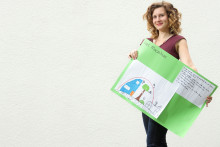‘The goal was to design a learning method for primary schools that allows children of different competency levels to work together and still be stimulated and learn’, Alieke van Dijk describes the aim of BE COOL!-project, within which she’s conducted her PhD research titled ‘Promoting intellectual giftedness during collaborative inquiry learning and learning by design’.
Cooperation, not social exclusion
Van Dijk studied sociology and psychology and after she acquired her Master´s degree, she worked on a high school learning project. Then she found out about BE COOL! and she immediately knew she wanted to be a part of it. ‘PhD research or not, I wanted to participate. When I was younger, I wanted to be a teacher and later I chose to study how people behave. This project combined all my fields of interest.’
According to Van Dijk, teachers are often afraid to use cooperative approach, because they worry the more gifted students would not get a fair chance to develop their talents. That means high-level students are given individual work, which makes them socially excluded. ‘I was a good pupil myself, always finished early with my weekly assignments. Once already by Tuesday morning’, laughs Van Dijk. ‘But I also liked being with my friends and I can imagine it makes you feel left out if you can’t work with your classmates.’
Learning together
‘We wanted to create a possibility for children to learn together. For BE COOL!, we’ve worked with 33 schools in Lelystad. We’ve created lesson series during which children have to design moon houses. Each child is assigned a topic, such as water or nutrition, based on its own ability level’, explains Van Dijk. ‘Every child then has to research this topic. To complete the assignment, all children within one group have to combine their knowledge, so each topic is represented.’
Van Dijk was responsible for all research within BE COOL!-project. For example, she focused on how to support cooperation of children with mixed abilities and she also compared this new teaching approach with traditional education. Now, Van Dijk is already finishing her PhD thesis. ‘If I had to summarize, I’d say that even though there are large differences between children, it is possible for them to effectively learn in mixed ability groups. They don’t need to be separated.’






